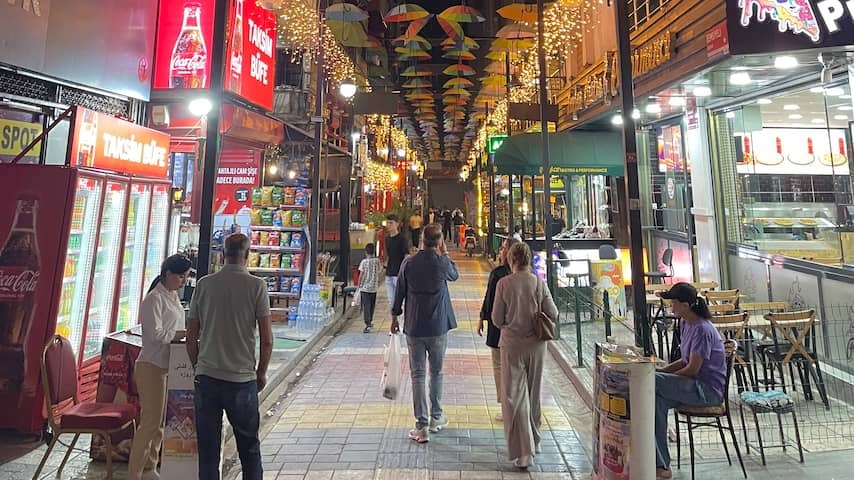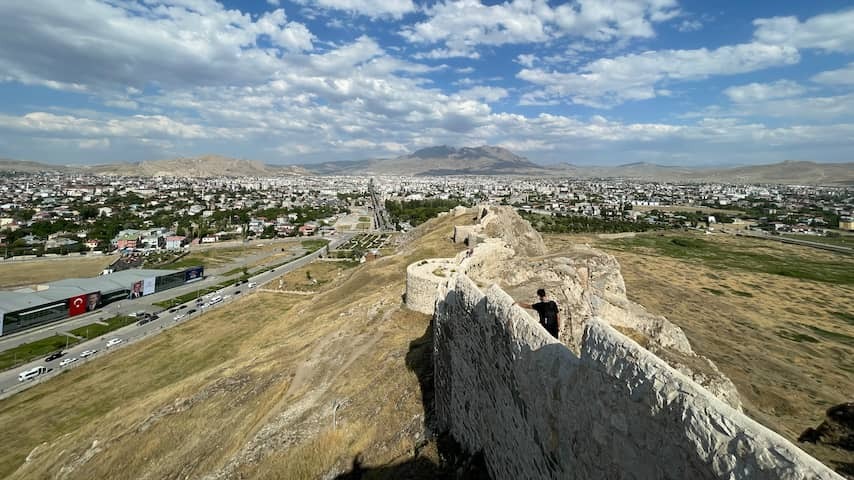 Okay, here’s the extracted, translated, and formatted content:
Okay, here’s the extracted, translated, and formatted content:
The Turkish city of Van is a popular destination for day-trippers from Iran. But for the past two weeks, the city has also been a refuge for Iranians, as NU.nl witnessed on the ground. There, they could escape not only the air strikes but also the Iranian regime.
Blue eyes are not common in Iran. Yet, upon arrival in Van, I (with light hair and blue eyes) am asked by my taxi driver if I am from Iran. According to him, driving Iranians to and from the airport is more of a rule than an exception, especially in the past two weeks.
Many Iranians are in Van to escape the Israeli attacks. This includes Mohammad, Ali, and Golnaz, who left the day after the first shelling of the Iranian capital, Tehran. They left not only because of the violence but also because the internet was shut down, preventing them from doing their work (technical inspections).
Through their German employer, they were able to travel to Turkey to work online remotely. “Of course, we were angry when the attacks started, but mainly at our own government,” says Mohammad. “Besides, in my opinion, the population was not the target.”
“I condemn the Israeli attacks and consider them illegal,” adds Ali. “At the same time, our regime is also at fault. People like us are actually caught between two evils.”
‘Staying in Van Gives Iranians Breathing Room’
Mohammad, Ali, and Golnaz are in Van for the first time and understand its appeal. It is the largest city in the vicinity and is located ‘only’ 100 kilometers from the Iranian border, a negligible distance in this region. Additionally, Iranians can obtain a tourist visa allowing them to stay in Turkey for up to ninety days.
Above all, more is possible and allowed in Van. “Here, we can drink alcohol in a café,” says Ali. The city council and local entrepreneurs seem to be capitalizing on this, as there are a striking number of pubs and liquor stores in the center for a Turkish provincial town.
“And I don’t have to wear a headscarf,” adds Golnaz. This is something Ayda is also happy about. She works in a catering establishment frequented by Iranians. “A stay in Van gives Iranians breathing room. Women here don’t have to worry about dress codes. This allows us to escape the pressure of the regime for a while.”
A little further away stands Safa Kousehlou (the woman on the right in the main photo). She sells tickets for boat trips, tours, and nightclubs. She also emphasizes the importance of the freedoms that Iranians enjoy in Van. “It gives peace of mind. We can dress as we want here, do what we want, and speak freely.”

Many Iranians Noticeably Reserved with Information
However, just because Iranians in Van can say what’s on their minds doesn’t mean they all do. For example, they prefer not to talk about war with Israel in detail, even though it now seems to be over. Only Zanjan Saeed wants to share his outspoken opinion: “Death to Israel.”
Zanjan occasionally works as a plumber in Turkey, but he is not very hopeful about the future. After some urging, he does want to say something: Iran should receive more respect from the international community. How that aligns with his earlier statement, Zanjan leaves unanswered.
Many other Iranians are noticeably reserved with information. At the Van bus station are several Iranians who live in Canada. One of them is a woman who has just arrived with her two daughters. She does not want to give her name. Due to the recent violence, she has decided not to travel to her home country after all. Instead, she is going somewhere else in Turkey with friends. She doesn’t yet know exactly where.
For a moment, it seems as if she is willing to answer a number of substantive questions from NU.nl. But after consulting with another lady in the group, she decides against it. She doesn’t feel comfortable with it. Earlier, Ayda also wanted to reveal little about the war. She only said that she is relieved that the shelling is over.
‘Change is Not Achieved Through Air Strikes’
Sixteen-year-old Mobin from Urumiyah is willing to talk. He and his mother have been in Turkey for a week now. Here, they are biding their time. Due to the recent violence, they do not want to return to their country for the time being. The fact that the shelling has now stopped gives them cautious hope.
Nevertheless, Mobin sees a future for himself in Turkey, not in Iran, at least in the near future. For his country and the region, he simply hopes that mutual ties will be strengthened and restored.
Mensur already lives abroad, coincidentally also in Canada. For his company, he had to be in his hometown of Tehran earlier this month. The work visit was shortened due to the violence. “We just have to deal with it,” he sighs. “It seems to be part of existence.”
Like Mohammad, Ali, and Golnaz, Mensur also does not believe that the Iranians themselves were the target of the recent attacks. His company also remained literally and figuratively out of the line of fire. He hopes for change and improvement in the future. The fall of the Iranian regime may be part of that. But, Mensur emphasizes, “that process must be initiated by the population itself, not by air strikes from abroad.”